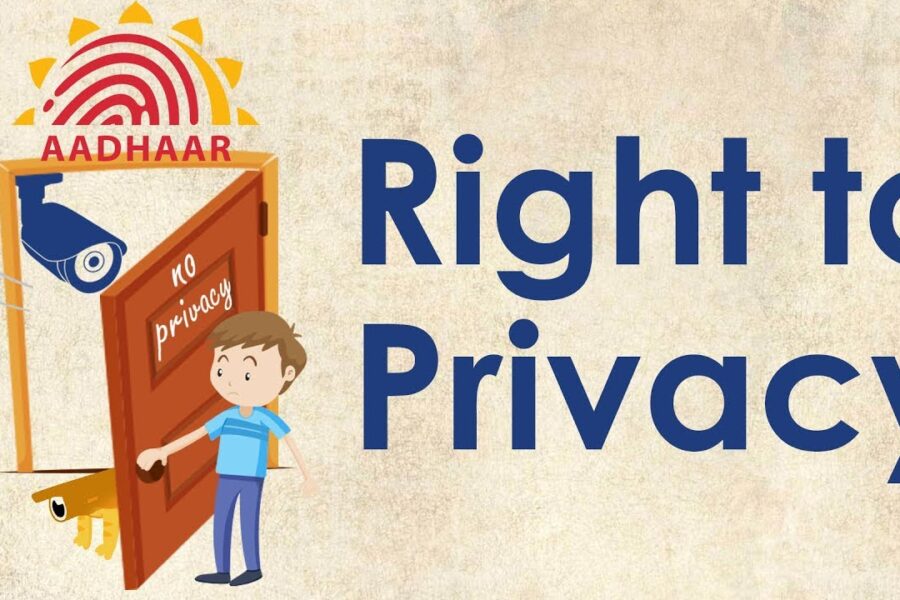INTRODUCTION
Although a precise legal definition of “privacy” is not yet available, certain legal professionals generally agree that privacy is a human right that every person has just by virtue of their existence. None of the instruments or charters matter. Moreover, privacy can expand to cover more areas such as physical integrity, individual liberty, informational self-determination, privacy, dignity, and freedom from government monitoring.
INDIAN LAW PERTAINING TO RIGHT TO PRIVACY
The right to privacy is not expressly protected by the Indian Constitution.
However, over the years, the nation’s courts have rendered a number of rulings. believing that the other rights in the Constitution—most notably the right to life and liberty found in Article 21—give birth to a (limited) right to privacy. This interpretation was contested in 2015 and brought to the Supreme Court’s bigger Bench in the writ case of Justice K.S. Puttaswamy & Others vs. Union of India and Others.
In a major decision on August 24, 2017, the Court unanimously decided that the right to privacy is a fundamental freedom and that it is safeguarded as a component of the freedoms guaranteed by Part III of the Constitution, which includes the right to life and personal liberty. The Bench further decided that, like all other fundamental rights, the right to privacy is susceptible to reasonable limitations rather than being unassailable.
EXISTING LAW ON PRIVACY
The Information Technology Act of 2000 governs this right in the absence of a separate privacy law. There are specific provisions in the Act that protect people from business entities violating their privacy. In 2008, the Act was revised to include Section 43 A, which imposed reparation obligations on companies that compromised sensitive personal data.
In order to safeguard people’s privacy, the government formulated eight regulations in accordance with Section 43A of the IT Act, 2000. These are all related to requiring consent from an organization before accessing personal privacy data and establishing penalties for violating the same.
SUPREME COURT ON RIGHT TO PRIVACY
On August 24, 2017, a nine-judge Constitution Bench led by Chief Justice J.S. Khehar rendered a historic ruling regarding the right to privacy. The Supreme Court declared that the right to privacy is “intrinsic to life and personal liberty” and that it is a fundamental freedom that is protected by both Article 21 and Part III of the Constitution. The Chief Justice stated that the Court had overruled its own eight-judge bench and six-judge bench rulings in the M.P. Sharma and Kharak Singh cases, delivered in 1954 and 1961, respectively, that privacy is not protected under the Constitution, after reading the unanimous decision reached by the nine-judge bench. A five-judge bench led by Chief Justice J.S. Khehar had referred the issue of whether or not privacy is a basic right to the numerically superior nine-judge bench in order to overrule these two precedents.
The biometric identity project Aadhaar may now be put to the test by the ruling.
The nine-judge panel declared that the right to privacy was just as important as the rights to life and liberty, and that the decision will shield citizens’ individual liberties from government interference.
IMPLICATIONS OF THE JUDGMENT
The landmark decision by the nine-judge Bench to declare privacy an inherent right guaranteed by Part III of the Constitution and essential to life and liberty has resulted in a historic development: any citizen can now file a direct case against the Supreme Court and the High Courts for infringement of their fundamental constitutional rights.
Since privacy is now deemed an essential component of life and liberty under Article 21, anyone can petition the nation’s constitutional courts under Articles 32 and 226 to obtain justice, regardless of whether they are an Indian national or not.
The Supreme Court made privacy a necessary component of other significant fundamental freedoms, such as the right to equality, the freedom of speech and expression, the right to practice one’s religion, and a host of other significant fundamental rights necessary for a dignified existence, subject to reasonable restrictions of public health, morality, and order. The Court did this by holding that privacy is inherent to every single fundamental freedom in Part III of the Constitution.
CONCLUSION
The right to privacy is a fundamental human right essential for individual freedom and dignity. In a digital age where personal data is extensively collected and analyzed, protecting privacy is crucial. Balancing technological advancement with personal data protection requires robust legal frameworks and ethical practices from governments and corporations.
Privacy is dynamic, evolving with new threats and opportunities. Upholding this right ensures individuals maintain control over their information and autonomy amidst increasing surveillance. Protecting privacy is about more than data security; it’s about preserving human essence and dignity. By fostering a culture that values privacy, we build a society where individuals feel secure and free to express themselves without fear of intrusion. Championing the right to privacy is a collective responsibility, vital for maintaining democratic values and safeguarding personal liberties. It remains a crucial pillar of a just and free society.
Contributed by – Ishita Saxena
(Symbiosis Law School, Noida 2023-28)

